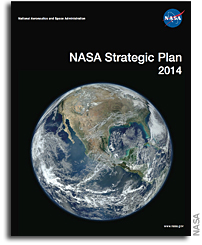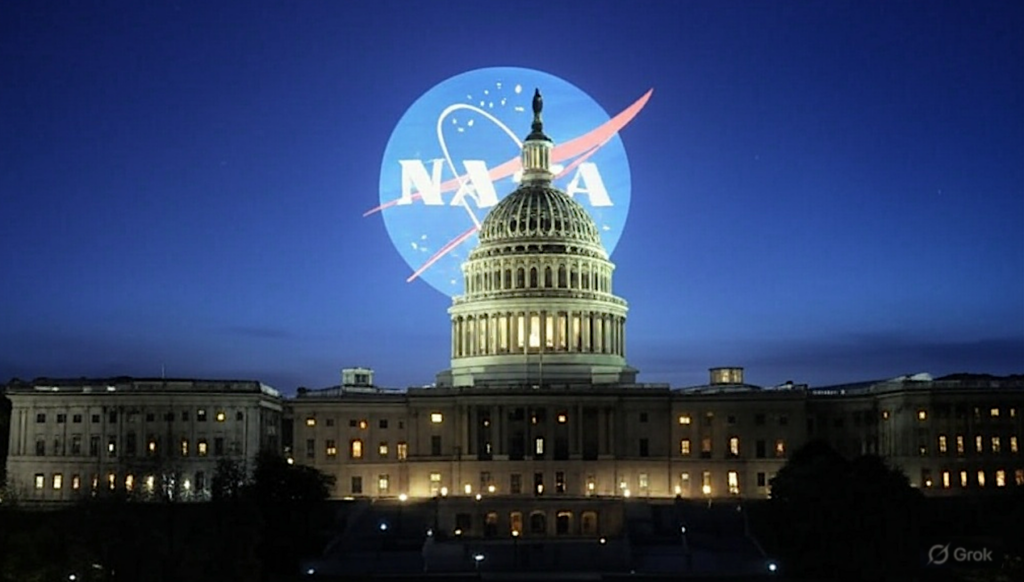NASA's Strategic Plan Isn't Strategic – or a Plan
 Message from the Administrator NASA’s Updated Strategic Plan
Message from the Administrator NASA’s Updated Strategic Plan
“We stand at a pivotal moment in space exploration and our ability to improve life on our planet. Humankind is making plans to further extend its reach into the solar system, and NASA is leading the way. Our orbiting outpost, the International Space Station (ISS), is home to a crew of astronauts from across the world conducting research and learning how to live and work in space. “
 Keith’s note: This thing reads like an annual report – there is no “plan” in this strategic plan. The authors are utterly confused as to what a “goal”, “objective”, and “strategy” are and confusingly use the terms interchangeably. It is almost as if they say “it is important that we do what we are doing because we are already doing it”. Also, doing things in a cost-effective and innovative way seems to be some sort of strategic objective preoccupation with the reports’ authors. Well, DUH, you should always do such things in a cost-effective and innovative way as a matter of course in ANY project – government or otherwise – not do so as an end in and of itself.
Keith’s note: This thing reads like an annual report – there is no “plan” in this strategic plan. The authors are utterly confused as to what a “goal”, “objective”, and “strategy” are and confusingly use the terms interchangeably. It is almost as if they say “it is important that we do what we are doing because we are already doing it”. Also, doing things in a cost-effective and innovative way seems to be some sort of strategic objective preoccupation with the reports’ authors. Well, DUH, you should always do such things in a cost-effective and innovative way as a matter of course in ANY project – government or otherwise – not do so as an end in and of itself.
It is like saying “our goal is to drive under the speed limit on the right side of the road” as an objective – when your real objective is to travel to a specific location. NASA is bafflingly confused when it comes to form and function, cause and effect, and that the specific managerial process of doing something and actually achieving a specific goal are not the same thing.
Then again NASA people often cannot tell the difference between nouns and verbs. Ever hear a NASA person say they are going to “action something”?









Ha-ha! Where else but a government agency can you find a “plan” that is 50 pages filled with text that say absolutely nothing?
Attention all you folks who write papers: Read the plan if you want a perfect example about claiming to be bold, innovating, leading the world, and yet not once in 50 pages ever sticking your neck out and saying anything concrete. Just hand waving and vague references to some bright future.
Of course, the truly sad part is that I am not surprised.
The problem with government strategic plans is that they have little connection to the budget process or political reality. A requirement under the Government Performance and Results Act, the first plans were published in 1994. Produced every three years, sometimes they are a product of an interagency group process, while other times the document is produced by a single office or insular group. Even though individual performance plans are supposed to tie directly to the articulate goals, employees pay scant attention to the document since they have learned that the plans are of little use and seldom followed.
In that first year of GPRA the Strategic Plans were graded, but there was little attention paid to the scores and there were no significant penalties for a low grade. At a Senior Management meeting a very senior NASA official commented, “Well, if we get a C+ that will be ok.” I never thought I’d hear that an average score was ok at the agency that is supposed to be the world leader in space research, development, and exploration. Program offices were reluctant to state specific goals and would only commit to “purposes.” As Keith points out, the use of words such as goals, objectives, ad strategies are still somewhat confusing.
Some where in the process the Strategic Plan is supposed to align with the budget. While there may be some progress related to the budget submission, I’m willing to bet it falls apart once budgets are finally approved. The content and stated goals are only as good as the budget commitment from Congress to implement the plan. People can herald the recent Authorization Acts has major steps forward in bipartisan support for NASA, but if the necessary funds are not appropriated the applause sign ought to be turned off.
Like so many things in government, there are plenty of dedicated civil servants who are passionate about their jobs and want to do their best for the agency. Unfortunately, those involved in the process to develop a strategic plan can only be effective if the budgets are provided to support the plan and if there final document is taken seriously.
Well said. I would add to that as Keith and Alan agree, there is confusion in the use of terminology. And specifically, the 3rd Strategic Goal is not a goal but rather a modus operandi for achieving Strategic Goals 1 and 2. It actually indicates how problematic effective management is within NASA.
Nevertheless, considering all the other variables, NASA’s 2014 Strategic Plan is adequate. From our point of view, we, as tax payers and space advocates, have something far more challenging and of more concern. It is the risk that we will just keep on arguing and this “pivotal moment” as Charlie B. points out, will pass us by. Powerful lobbying forces, the Supreme Court now permitting unlimited donation levels by the rich, and the level of corruption in Washington now, creates a huge barrier to any one of us or one of many groups making a difference. NASA has stood at the forefront of technology advances and if we are to make a difference in the path taken to execute the strategic plans, we need to utilize the technology at our disposal to create an effective voice. Time is running out.
Concerning “It is the risk that we will just keep on arguing and this “pivotal moment” as Charlie B. points out, will pass us by.”
Passing by is not the problem. Going extinct in the mean time is! – is that what you meant?
NASA or its two primary directorates – Science and Human Spaceflight, will not disappear. This pivotal moment is an opportunity to make the right choices. Failing to seize the moment takes us down a path where the US space program is no better than other programs and we use public funding ineffectively. Many would argue that the latter has been the case for human spaceflight for 30 years and I would then ask – do we allow this to continue. And allow our program to become second rate means losing a competitive edge. And the dissemination of knowledge from discovery is in far better hands with this imperfect union than some others. If you assume that the 2015 NASA budget in total will be no more than 2014’s, then you have to look inside the requested budget and look at the 2014 allocations as a starting point and guidance. In a comment at http://www.spacepolicyonlin…, I gave it a shot and concluded that requested funds from Space Ops will likely be shifted to SLS/Orion to match 2014 levels for both. Space Technology, involving R&D for the Asteroid Initiative will likely be reduced to 2014 levels and those freed up funds could give Commercial Crew the requested funding. But this leaves SMD (Science) with the requested level – less than 2014. Can you expect the Administration (NASA & W.H.) to suddenly say, well we actually want more funding for SMD. No. NASA and the White House has left SMD to fend for themselves, as much as that is possible. I think the only chance is for leaders in the respective fields impacted and leaders of space missions to stand up and plea and petition for a funding level that will sustain or better yet, create new opportunities that match the pace at which the World is changing. NASA really needs to be funded at $18 Billion ($500M more than requested) but more than that would be throwing good money after bad … not until we correct the human space program (HEOMD).
While I appreciate Mr. Ladwig’s voice of experience, I do not accept it.
If the plan is too detailed or trying to be too much to too many then the plan is meaningless. which it appears to be.
While the budget, Congressional and Presidential support need to move in complementary directions, if there is no plan then there is nothing to judge anything against.
If there is no meaningful plan then it means the NASA management failed. The plan is management’s job. Without a plan there is no way to judge whether anything your people are doing makes any sense.
By the way, in my job at NASA, I see this all the time. It has become the norm:
“I think we ought to produce this”.
Why?
“Well I think it would be good.”
Well, what is your goal?
“Don’t really know what the goal is, we have no stated goal; but it would be nice if we had this product.”
So you are deciding on the product and the millions or billions of dollars and the commitment of people and time based on your extensive expertise, experience and education?
“I’ve only been in this [management] job 6 months. I’ve never worked in this function before in my career. My education; I’m an engineer, I can do anything I put my mind to.”
Why do you think you are qualified and competent to make this decision to spend these millions of dollars?
“Because the guy who promoted me into this position has confidence in me and he holds the budget.”
Do you think it would be wise to bring in some experts who have the education or the experience to advise you?
“No. I am the leader. I will make the decisions.”
I’ve seen this happen with major programs like Constellation and with research studies, documents, Shuttle launches…..
The attitude Ladwig reflects is a defeatist attitude and if we keep it up then the situation will not improve. Right now NASA is failing.
The matter of budget is at the heart of the matter. Knowing what resources you have and are likely to have is a requirement, it’s situational awareness. Screaming about lack of budget is no excuse for lack of a strategy consistent with a resource picture, and also consistent with your goals.
Organizations derive strategy AFTER developing situational awareness, that realistic understanding of people and resources. Imagine the Navy brass had screamed BEFORE Midway that they lacked resources, but would develop a viable strategy for Midway AFTER they had 20 carriers for the task. That is essentially what NASA brass does nowadays. Deny reality, complain, lay low, fantasize about budgets cause “space is hard” (repeat till nauseous). And all the while perfectly good strategies, albeit with calculated risks, are put down and actually attacked, in favor of just complaining about lack of resources.
A good plan works with the resources expected at hand. The rest is resource advocacy, and more than that, just wishful thinking, not a plan.
NASAwatch often asks why NASA doesn’t behave more like private corporations: Consolidated IT policies, unified communications, etc. I think this report is a key reason why that’s not always good. Corporations, especially in aerospace, are so hidebound and process driven that very little of value can get done. Communiques are homogenized and stripped of all content before being officially released. NASA is doing exactly this.
In the not-so-distant past Universities, National Labs, FFRDCs, small, midsize, and large companies had distinct cultures, emphases, and leadership. Technical people could pick one and then move if and when their interests changed. That’s no longer the case. The behemoth corporate mentality and its associated doublespeak is everywhere, a particular type of corporate hack is at the helm, and all have the sole intent of doing as little as possible to maximize margins. We went to the moon in about eight years. That’s now a span to a Preliminary Design Review.
I skimmed this report and, as a long-time and eternal space cadet, I can only describe it by one word: boring. NASA is doing too much with too little, dictated by political whims and pork. As an idealist, they should pick something big, and then everything they do is justified by that goal. I really wish this report said something like “Our goal is a permanent presence on Mars, and here are the specific program steps that we must do to get there.” Or, my favorite, “Our goal is to open space up to all for new commerce and exploration, and this is how we are going to do it.” Either of these would be more exciting.
the problem is… NASA doesn’t really get to pick what they do.
NASA plan to facilitate the building of the inner solar system highway.
there is no “plan” in this strategic plan
This is the problem. They have no plan.
NASA has become a bunch of hobby shop projects.
That is what happens when there is no leadership.
Some projects like ISS are big and expensive but are not integrated into the big picture, whatever that would be. They try to make it up as they go along, Utilization, technology, science, exploration, what really are they aiming for?
Thank you for saying exactly what I have been saying for years about “strategic” “plans” within NASA, both at the agency and center levels. At best, some of the plans have a little bit of tactical content, but there is never anything remotely resembling strategy. The new “plans” for Aeronautics research are another example. The documents and slide shows for it are an incoherent, internally inconsistent mess.
It seems if plan too specific, then criticized for being too narrow in focus. If too general then criticized for being too vague. Give a broad statement, “expansion of human knowledge of phenomena in the atmosphere
and space” can be criticized of not knowing what are talking about. And this is among people involved with space, who knows what outsiders perceive. Some say NASA should be like a private company but much of what they are directed to do has nothing about increasing revenues and stock market prices.
It gets confusing to me, sometimes I go back to what was originally written to understand what NASA is or was intended to do. http://history.nasa.gov/spa… and currently listed http://www.nasa.gov/offices…
Folks:
NASA shouldn’t have a plan. Their number one ‘goal’ should be to facilitate others plans.
This seems to have worked out with commercial cargo and crew, so why not use that as a model to achieve that goal.
‘Mission’ should be forbidden on any future NASA document!
tinker
Great idea, Tinker! Let’s let the Senate establish a plan!
Lololol
Michael:
I didn’t mean them! Sorry, I though that was obvious.
‘Missions’ end up like Apollo, ‘strategic planning’ ends up like the Space Shuttle program.
The best way to leverage the good parts of that knowledge base is to pass it on to commercial ventures so they can finally get it right.
tinker
The Palindrome Plan:
“A man, a plan, a canal – Panama!”
Even George W. Goethals, (the Man) who successfully led the completion of the Panama canal, celebrated by the famous palindrome above, had to create a plan to deal with the massive scale of the required work. He came up with a plan, implemented it and it worked.
Wasn’t he building a highway from one place to another that could be used by others over and over???
You are exactly correct. Try getting the US Congress to spend money on any sort of infrastructure. Our country id in need of roads, bridges, trains, airports, projects cheaply financed in a time of historically low interest rates.
Same with space. I don’t really care where they send astronauts: what matters is building up an infrastructure the rest of us can use to make money. This is a lesson far too simple for the congress critters to actually comprehend.
Keith—we had the same discussion “inside” when this document came out, and not for the first or last time.
I pointed out the same issues – near exactly your points. You hit on these very well. NASA’s strategic plan has no real strategy (how), or plan (activities), also lacking goals or objectives (why/what). Destinations (where) are at times confused with goals. The plans are often dominated by “who” (whoever is the current player), confusing that means with an end (space exploration).
This is not the first time I’ve seen this, and also pointed it out. All of this has happened before…(I’ll probably not get called on this activity ever again). We saw this kind of activity heading toward being just glossy brochures and confounding, vague statements since the late 90’s when I first got pulled into these exercises (directorates would also do these, as well as centers, etc.) At least then we got the glossy brochures that looked cool and had pretty pictures for the coffee tables in the head offices. Now we don’t even get that.
Right now there is no incentive to do real strategic planning in NASA. The exercise followed to it’s natural conclusion would inevitably have to arrive at tactics, it would derive at lower levels an architecture, one consistent with relevant time-frames, likely budget outlooks, etc. The team doing this right would find a total disconnect from current activity that makes up very low level tactics (like SLS/Orion), and then be skewered as being negative, criticism, etc. Such a team would quickly be shown the door, and people would suffer -as if they had disregarded orders, or been troublemakers. I’ve literally been there, done that, and seen this.
Management wants pretty brochures-nothing more-now as pdfs.
Of late the best thing to do is avoid the matter, show up to a meeting, be tolerated when pointing this out if done right, then make sure I accept no action items that would waste my time on these public relation atrocities some dare call strategic plans.
I have wondered for some time why no one at NASA seems to realize that SLS/Orion is doomed, even though it is obvious to us as disinterested observers. Now I understand. Those who figure out the truth are eliminated from the gene pool.
Surely you don’t mean ‘no one’? One supposes that a certain sense of malaise amongst the best and brightest is inevitable.
The ability to understand a general situation, ask the right questions and come up with a practical plan to solve the problem or reach a stated goal is significantly different from the type of situation or goal being addressed. To say that NASA should not have any plans is like saying a drowning man should not try to swim. Even the robotic program has plans which in the most part have been well carried out. That part of the program has not been affected as much by outside political pressures as the human spaceflight program. No private company has the resources to do pure exploration right now, but using the services of private companies a lot more is exactly what NASA needs to be doing.
President Bush had a plan, congress did not fund it. President Obama tried to cancel Bush’s plan, congress refused to cancel it or fund it adequately, so of course NASA is adrift. If NASA tries to move money around to achieve some goal, (as they did for Constellation) politics gets involved and the work stops. We are getting exactly the NASA that the voters want. They don’t want taxes raised or jobs cut. If that means that NASA can’t accomplish anything, oh well. As long as politics is more important than achievement, expect more of the same.
It’s not a matter of available money but the way it is spent. Ours is an incredibly rich country. We do have the funds.
Oh, wait. Let’s invade some countries! And let’s protect Europe, and Japan, too!
Sorry guys. It just so pisses me off.
soon to be protect Ukraine to that list…
Interesting dialogue. First, no strategy is possible without a leader to frame the strategy. Like it or not, Mike Griffin had a plan, based on the “direction” he had from the White House he formulated an outcome that was based on goals and objectives.
Problem today is that the Strategic Plan is a document that is assembled by people who have little in the way of involvement in the day-to-day business of NASA. This is unlikely to change with the current leadership. Much time is spent criticizing the plan Mike Griffin had, but he provided a plan that could be critiqued. NASA’s plans today change from minute to minute. The ARM mission is a reflection of that. NASA spent half a day telling Industry the details of the work they have performed over the last year or so, now Industry has weeks to add to the mix. Clearly the “plan” for ARM is to give NASA what it wants, a Multi-Billion dollar mission that won’t fit within the current budget, so that NASA will have the ability to complain that they will do (fill in the blank) if Congress will fund them.
The days of growing budgets are gone, there are many options to do the missions that need to be done, but not with weak planning and leadership in place today. The Strategic Plan is just more proof that NASA today is not the NASA we need.
It’s clear that GM needs a strategic plan. They design and build things using their own money that people may or may not want to buy, and they are responsible to their shareholders for doing this in a timely and profitable manner.
NASA, on the other hand, does none of these things. They are told what to design and build by Congresscritters who only seem concerned about how this or that random program affects their chances for re-election. Whether or not any mission actually accomplishes anything or does so on schedule and budget seems almost irrelevant. Scientifically important results are just curious artifacts of the bigger picture process feeding votes into the correct congressional district.
That is why NASA’s inability and failure to generate a useful strategic plan does not set off any warning bells in the halls of Congress or elsewhere.